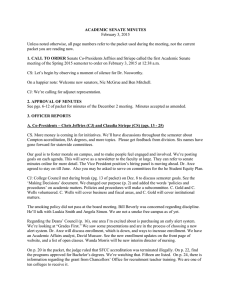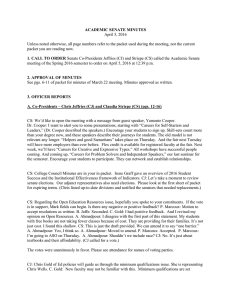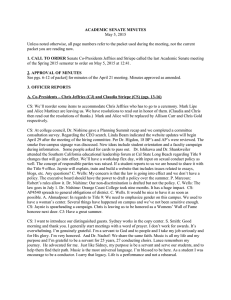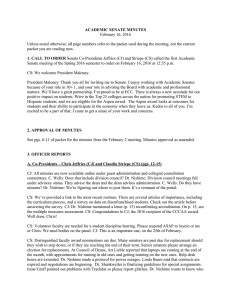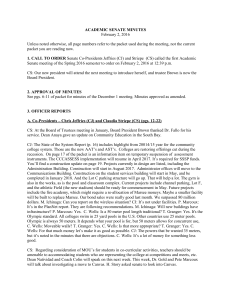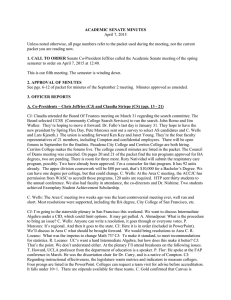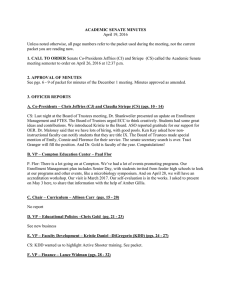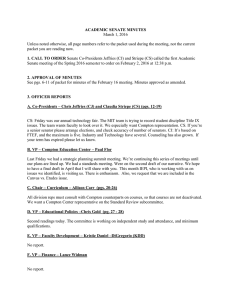ACADEMIC SENATE MINUTES March 3, 2015
advertisement
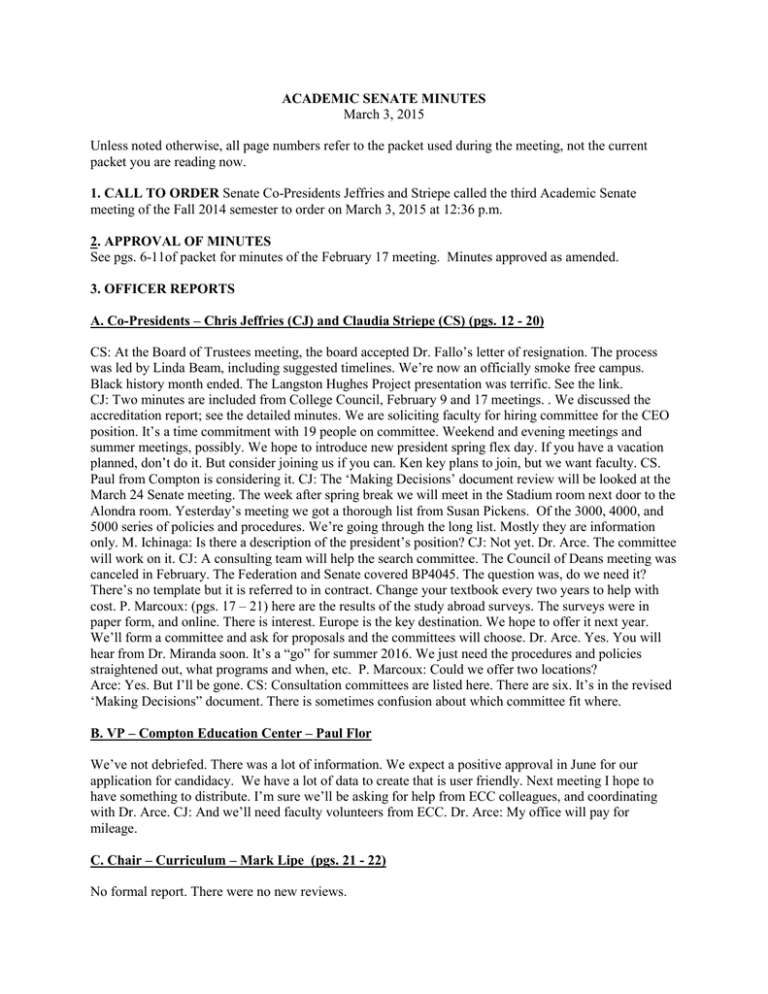
ACADEMIC SENATE MINUTES March 3, 2015 Unless noted otherwise, all page numbers refer to the packet used during the meeting, not the current packet you are reading now. 1. CALL TO ORDER Senate Co-Presidents Jeffries and Striepe called the third Academic Senate meeting of the Fall 2014 semester to order on March 3, 2015 at 12:36 p.m. 2. APPROVAL OF MINUTES See pgs. 6-11of packet for minutes of the February 17 meeting. Minutes approved as amended. 3. OFFICER REPORTS A. Co-Presidents – Chris Jeffries (CJ) and Claudia Striepe (CS) (pgs. 12 - 20) CS: At the Board of Trustees meeting, the board accepted Dr. Fallo’s letter of resignation. The process was led by Linda Beam, including suggested timelines. We’re now an officially smoke free campus. Black history month ended. The Langston Hughes Project presentation was terrific. See the link. CJ: Two minutes are included from College Council, February 9 and 17 meetings. . We discussed the accreditation report; see the detailed minutes. We are soliciting faculty for hiring committee for the CEO position. It’s a time commitment with 19 people on committee. Weekend and evening meetings and summer meetings, possibly. We hope to introduce new president spring flex day. If you have a vacation planned, don’t do it. But consider joining us if you can. Ken key plans to join, but we want faculty. CS. Paul from Compton is considering it. CJ: The ‘Making Decisions’ document review will be looked at the March 24 Senate meeting. The week after spring break we will meet in the Stadium room next door to the Alondra room. Yesterday’s meeting we got a thorough list from Susan Pickens. Of the 3000, 4000, and 5000 series of policies and procedures. We’re going through the long list. Mostly they are information only. M. Ichinaga: Is there a description of the president’s position? CJ: Not yet. Dr. Arce. The committee will work on it. CJ: A consulting team will help the search committee. The Council of Deans meeting was canceled in February. The Federation and Senate covered BP4045. The question was, do we need it? There’s no template but it is referred to in contract. Change your textbook every two years to help with cost. P. Marcoux: (pgs. 17 – 21) here are the results of the study abroad surveys. The surveys were in paper form, and online. There is interest. Europe is the key destination. We hope to offer it next year. We’ll form a committee and ask for proposals and the committees will choose. Dr. Arce. Yes. You will hear from Dr. Miranda soon. It’s a “go” for summer 2016. We just need the procedures and policies straightened out, what programs and when, etc. P. Marcoux: Could we offer two locations? Arce: Yes. But I’ll be gone. CS: Consultation committees are listed here. There are six. It’s in the revised ‘Making Decisions” document. There is sometimes confusion about which committee fit where. B. VP – Compton Education Center – Paul Flor We’ve not debriefed. There was a lot of information. We expect a positive approval in June for our application for candidacy. We have a lot of data to create that is user friendly. Next meeting I hope to have something to distribute. I’m sure we’ll be asking for help from ECC colleagues, and coordinating with Dr. Arce. CJ: And we’ll need faculty volunteers from ECC. Dr. Arce: My office will pay for mileage. C. Chair – Curriculum – Mark Lipe (pgs. 21 - 22) No formal report. There were no new reviews. D. VP – Educational Policies – Alice Martinez (pg. 23) We’re still working on the same policy but we will work on the textbook policy first. We’re waiting on re-writes to the sexual misconduct policy. E. VP – Faculty Development – Kristie Daniel –DiGregorio (pgs. 24 - 29) No formal report. Minutes from the meeting are in the packet. F. VP – Finance – Lance Widman (pgs. 30 - 32) On p. 31-33, you’ll find the 2/5 PBC Minutes: Very thorough discussion updating the enrollment situation following the end of adds, impact of summer enrollment on making cap for 2014-15. G. VP – Academic Technology – Pete Marcoux The ATC is meeting March 10, in the library, room 202 to s PlanNet. We’ll evaluate faculty laptop needs. H. VP – Instructional Effectiveness/ Assessment of Learning Committee and SLO’s Update – Karen Whitney (pgs. 33 - 37) The completion reports for assessment for course level are now available. Compton is winning at 77%. Half of the PLO’s are submitted. We want them all posted to the website. If you have anything outstanding get in in as soon as possible. 4. SPECIAL COMMITTEE REPORTS A. ECC VP of Academic Affairs and ECC VP of Student and Community Advancement – Francisco Arce and Jeanie Nishime Dr. Nishime: I’ve posted a timeline for addressing three recommendations. I’ll present it at the next meeting. Two recommendations that will affect senate and consultation committees fall under the ‘Making Decisions’ document, and implementing what we said in the document. Recommendation 1 (dialogue and planning) must happen on many levels. We can codify what’s been done at the VP level in ‘Making Decisions.’ We have hired our new Dean of Counseling and Student Success: It’s Dipte Patel. She’ll begin April 1. CS: Who will direct the special resource center? Dr. Arce: We’re moving as fast as we can. B. El Camino Community College District IT Assessment (PlanNet Report) – Jo Ann Higdon with discussion led by Pete Marcoux – co-chair Academic Technology Committee (pgs. 38 – 40) P. Marcoux. Key areas related to senate are listed here in the PowerPoint. PlanNet created the report on p. 6 of the handout. Page 8 describes the ATC. The accreditation people weren’t clear so let’s use this. On page 10, they list the maladies that it is facing and poor performance in 10 areas. On page 11 see the survey results. On page 12, students want wireless coverage and a mobile portal. Faculty want support hours, coverage and classroom technology. Staff wants better staffing levels and modernizations. On page 13 there are recommendations. On page 14, the big recommendation is reclassifying the ITS director and like a vice president or cabinet position. On page 23 – 24, move the campus email to one hosted by Google or Microsoft. They talked about ETUDES and Myteam sites. On page 32, wireless issues on campus. These are expensive recommendations, 2.2 million dollars for one-time costs, $500,000 a year for increased salaries. That’s the plan in brief. Dr. Higdon: It’s a comprehensive plan. We don’t all agree with everything, but it’s a great overview. The survey information was deep. The IT staff appreciated that complaints came with an understanding of staffing challenges. We all want 24/7 services, but we’re not staffed that way. Other agencies may be good examples. The statewide online initiative should prove interesting. There are pros and cons to ETUDES and team sites. It’s a positive. There are probably undetermined costs. It’s clear to me that providers are different at different schools it’s critical to balance customization to off the shelf products. Every time we have a patch, you’re spending time to make sure customizations are adjusted. It’s a resource drain. A third party looked at it and PlanNet is well thought of. In accreditation, had they requested it, I could have provided an early draft on progress. They didn’t close that loop. A. Ahmadpour: Share analysis with bigger campus. P. Marcoux: There’s a time crunch. C. Gold. There’s a common course management system transition. There’s an online exchange. It may have FTES benefits. There should be a common testing system and tutoring. We can buy into pieces. C. Wells: At statewide Academic Senate, we discussed scheduling software. Is that part of it? C. Gold: That’s one of the initiatives. Dr. Higdon: ECC serves to host that group this month. One meeting has been held already. C. Wells: It looks great for retention success. M. Ichinaga: I though it was interesting that the report alluded to cultural changes. There’s a comment about point of views from monopolistic organizations. ITS is understaffed, but the culture has to change. Service level agreements are integral to the business world. We should expect services within a certain time. P. Marcoux: This new director will create a plan. We can talk about it at the ATC meeting. A. Ahmadpour: I read ‘No Profit Left Behind’ by Stephanie Simon on Politico who looked at Pearson as a model. I can forward it to mass email. P. Marcoux: The ITS leader to CIO is a shift to a new title. CJ: The salary differences are interesting. Mt. Sac starts at $168,000. There’s a huge gap there. A. Ahmadpour: They should be degreed in technology, not just a manager, a specialist. P. Marcoux: Reclassify the ITS leader to CIO? Very split results. C. Wells. The title may not be important. T. Muckey, In ACR. It’s constraining. I wish we could do the software installs for our programs. We have five computers we can’t get updated. Or system has not been aligned. We should move toward commonality between districts. Dr. Higdon: Chris is sensitive to titles. Salary gaps are on p. 15. It’s even worse. Managers get longevity increases. There’s a bigger disparity. Can we look at salary issues instead of titles? P. Marcoux: I agree but can the senate weigh in on that? A. Ahmadpour: Is it relevant to our classes? We have to emphasize the significance to the future of education. Look at the Getty. P. Marcoux: We need it at the highest level possible. CJ: Convert the mindset for departments. C. Wells: What about Ed policies? IT couldn’t do that? It restricted policy. P. Marcoux: Senate has the loudest voice on this one. 2. Move Distance Ed and media services under CIO. A. Grigsby: Separate Distance Ed and Media Services please. They serve different functions. In discussions we want to make that distinction clear. C. Gold: Distance Ed should stay under academic affairs. They passed a resolution to senate. Dr. Higdon. Distance Ed has two parts. One is technological, one is educational. C. Gold: The maintenance of technology is not their job, but choosing technology and platforms should remain under academic affairs. M. Ichinaga: Educational needs of Distance Ed should drive technology. I want closer coordination. A. Ahmadpour: Everything goes through a teacher. We shouldn’t lose that. But digital technology is so important. Why do we need a college of propaganda? C. Wells: Media services has dropped off. I don’t use college media services. How do they function now? P. Marcoux: Let’s describe that later and keep on Distance Ed. A. Martinez: It would be scary to put Distance Ed under IT. Under their position they should have to support Distance Ed. P. Marcoux: Can we do a poll and split it? Should Distance Ed move under ITS? Everyone’sagainst it. Lets talk media services. A. Grigsby. Media works simultaneously with ITS. Part of that happens under media services. The difference is the culture of service. ITS repairs. Media services helps. Let’s combine them under a new model. Dr. Arce: There is a creative component. We have a TV studio and public access channel, channel three. There are still opportunities on TV. It’s complicated. A. Ahmadpour: We can’t come to a conclusion? We’re new compared to other colleges. P. Marcoux: We have no opinion. Moving campus email? Google servers would be off our servers. We’re on so many watch lists, FBI, etc., that it’s hard to maintain. A. Martinez: Google would do it? P. Marcoux: They would look at our information. CJ: Students could use their private emails. Dr. Higdon: We’re often subpoenaed. We must produce pages of documents. There are limitations to retrieving material. P. Marcoux: They delete emails after 1 Gig. Dr. Higdon: It’s grandfathered. M. Ichinaga: My concern with third party sourcing is that we still have to manage the third party. We do it now and one holiday there was an incident with a third party upgrade, and the portal was out for weeks. You need management schools. CJ: A lot of schools are doing this. P. Marcoux: And cities. CJ: 84% use vendors. A Martinez: Can we talk to them: P. Marcoux: So no opinion yet. C. Wells. They’re all satisfied. Bakersfield, Los Rios, etc. L. Widman: We can talk to them and learn from them. A. Ahmadpour: Can a school recruit for an investigation? Get the thing from Jill George. P. Marcoux: This is just a straw poll. P. Marcoux: Wireless issues? We all want it. I’m hopeful this is helpful to Dr. Higdon and VP’s. It’s hard to justify to taxpayers to add WIFI to a building that will be torn down. Dr. Higdon: Send me the description. But wireless needs differ. CJ: What will we implement first on whole report, hiring description? March 11 is the deadline. Dr. Higdon: Use all avenues. If you have a strong feeling, send it to your VP. 5.UNFINISHED BUSINESS 6. NEW BUSINESS 7. INFORMATION ITEMS –DISCUSSION A. Adult Education Initiative – J. Anaya J. Anaya: We’re presenting on AB86, Adult Education. We will cover history of adult education and the governors restructuring plan, and the Compton (tri-cities) consortium. Dr. Wayne Diulio: director of Torrance unified and member of the South Bay consortium. Dr. Diulio: I’ll start with an overview. It started in San Francisco 150 years ago. Our purpose is to meet the needs of the community. It began with literacy needs but has moved one. Adult Ed today offers online classes on many needs. Here are some pictures of students. We meet the needs of our communities. The budget cycle impacted all of us in 2008 and 2009. A component was that we were placed in general fund and reduced by 30%. And local schools were given total say over budgets. Adults are not being serviced across the state. The Governor’s new plan is a one time, 25 million dollars and 70 consortiums to coordinate with community colleges. We need a streamlined pathway, academic and career, for students. The partnership is with business. And it’s regionalized. Here are the five program areas that will be funded, listed in PowerPoint. Our objectives are also listed, such as addressing collaboration and leveraging existing structures. The consortiums are listed in the packet. J. Anaya: The planning process started when legislation came into effect last year. We identified agents and roles, including guiding principles, and held weekly meetings with partners and stockholders. Students were excited about the partnership. It helps students become college material. We looked at best practices across the country. We submitted a plan March 1 that was predicated on funding. We made an asset map of programs, staff, etc. and evaluated current needs. We then compared them to offered services. This shows community members with new high school diplomas. Here are the English language learners in the district. It’s a high need. Here is the unemployment gap information. Alignments and transitions are shown here. Our plan addressed gaps. We want to restore or programs to pre-cut levels. We looked at acceleration strategies, and also professional development for staff and instructors. Here are our regional partners. Dr. Diulio: Our next goal is to build adult pathways, come March 27 at 1:30 to the South Bay Adult School. T. Muckey: Can we get together and talk? C. Gold: It looks great. What will the local impact be? More or less basic skills? J. Anaya: I’m frustrated with the information coming from Sacramento. With the plan behind us, presented this month. We have the funding to start filling in. I’m excited. A. Ahmadpour. Does it address what is marketable? J. Anaya: We address community needs. There’s a conversation that will continue. Dr. Higdon: One challenge is to take a regional view. Regardless of one time money, you must keep things operating. It’s hard to build a plan without a budget. J. Anaya: It’s like flying a plane while building it. M. Lipe: Is the Community Ed involved? Jose. We see it as a whole, a complete college including Community Ed. P. Gebhart: Cosmetology was wondering about your barbering plan. Dr. Arce: we need a non-credit curriculum committee. P. Flor: One disappeared constituency is older adults. Dr. Diulio: There’s a debate on that. The new program eliminated that. At this time there are no results. You’re correct on that. 8. FUTURE AGENDA ITEMS CS. Please get input from your faculty on these future agenda items. A. Moving up the Withdrawal Date B. Faculty Evaluations C. C-IDs/Articulation – Lori Suekawa D. BA degrees at Community Colleges E. Changes in BOGG fee waivers–C. Pineda F. Career Center services/activities – Y. Cooper 9. PUBLIC COMMENT 10. ADJOURN The meeting adjourned at 1:59 p.m. SD/ECC Spring 2015
